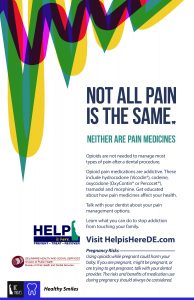NEW CASTLE (Feb. 5, 2021) –Two Maryland prescribers associated with a clinic in Denton, Maryland, on the Eastern Shore of Maryland surrendered their Drug Enforcement Administration (DEA) Registration for cause in early January. The associated prescribers to this practice are no longer able to prescribe controlled substances. Patients of this Eastern Shore practice, including Delaware residents, should seek alternatives for care.
Of the prescribers’ 300 now former patients, about 50% live in Delaware, mostly in Sussex County. To increase the opportunity for continuity of care for these patients, the Delaware Division of Public Health, the Delaware Division of Substance Abuse and Mental Health, the Delaware Division of Professional Regulation and the Office of Controlled Substances are coordinating efforts to notify hospital and community pharmacies, hospital emergency departments and treatment programs.
Delaware officials said the most effective way to provide the clinic’s former patients with guidance and referrals to other providers is through the patients’ primary care physicians. If that doesn’t occur, patients being treated over long periods of time for pain with opioids such as oxycodone, fentanyl, morphine and oxymorphone will need to access providers with expertise in treating and managing pain.
Delaware patients who are seeking referrals to physicians may contact the Delaware Hope Line at 1-833-9-HOPEDE (1-833-946-7333).
In addition, the U.S. Department of Health and Human Services’ Substance Abuse and Mental Health Services Administration provides a 24/7 National Helpline to provide referrals for treatment services at 1-800-662-4359.
While opioids serve a purpose in managing a patient’s pain, they belong to a family of prescription drugs, which can lead to addiction. Delaware is one of the top 20 states in opioid prescriptions per capita and currently has the nation’s highest prescription rate for high-dose opioids. Delaware also ranks in the top five states for most overdose deaths per capita.
In its annual report for 2019, the Delaware Division of Forensic Science reported 431 overdose deaths in Delaware, an increase of almost 8% over 2018. Of the 431 total deaths, the Division reported that 341 (79%) involved fentanyl, a synthetic pain reliever that is 50-100 times more potent than morphine. Many of those deaths involved fentanyl powder, fentanyl mixed with heroin, or counterfeit controlled substance pills containing fentanyl. The percentage of total overdose deaths in 2019 involving fentanyl was 5 percentage points higher than in 2018. A final report on overdose deaths for 2020 is not expected until April, but Delaware expects to see an increase in overdose deaths over the 2019 total.
Recognizing the importance of harm reduction, prevention, treatment and recovery, the Department of Health and Social Services (DHSS) launched www.HelpIsHereDE.com to offer resources to Delawareans and their loved ones suffering from substance use disorder (SUD). In 2020, DHSS also launched the 24/7 Delaware Hope Line at 1-833-9-HOPEDE (1-833-946-7333) to provide a connection to treatment for anyone suffering from substance use disorder, anxiety, depression, or any other behavioral health issue.
Division of Public Health Director Dr. Karyl Rattay urged Delawareans who are worried about the risk of overdose among family members or friends to obtain naloxone – a medication that can reverse an opioid overdose – through a new DPH mail-order service that can deliver Narcan to an eligible person’s home for free; at one of DSAMH’s Bridge Clinics in each of the three counties; through a participating pharmacy – where no prescription is required; or as part of a naloxone training session.
“Naloxone saves lives,” said Division of Public Health Director Dr. Karyl Rattay. “We also encourage Delawareans to download OpiRescue Delaware, a smartphone app that provides life-saving step-by-step instructions on how to respond to an overdose, including administration of naloxone.” To find the Bridge Clinic in your county, naloxone training or distribution events, or a participating pharmacy, go to HelpIsHereDE.com, and click on the overdose prevention tab.
